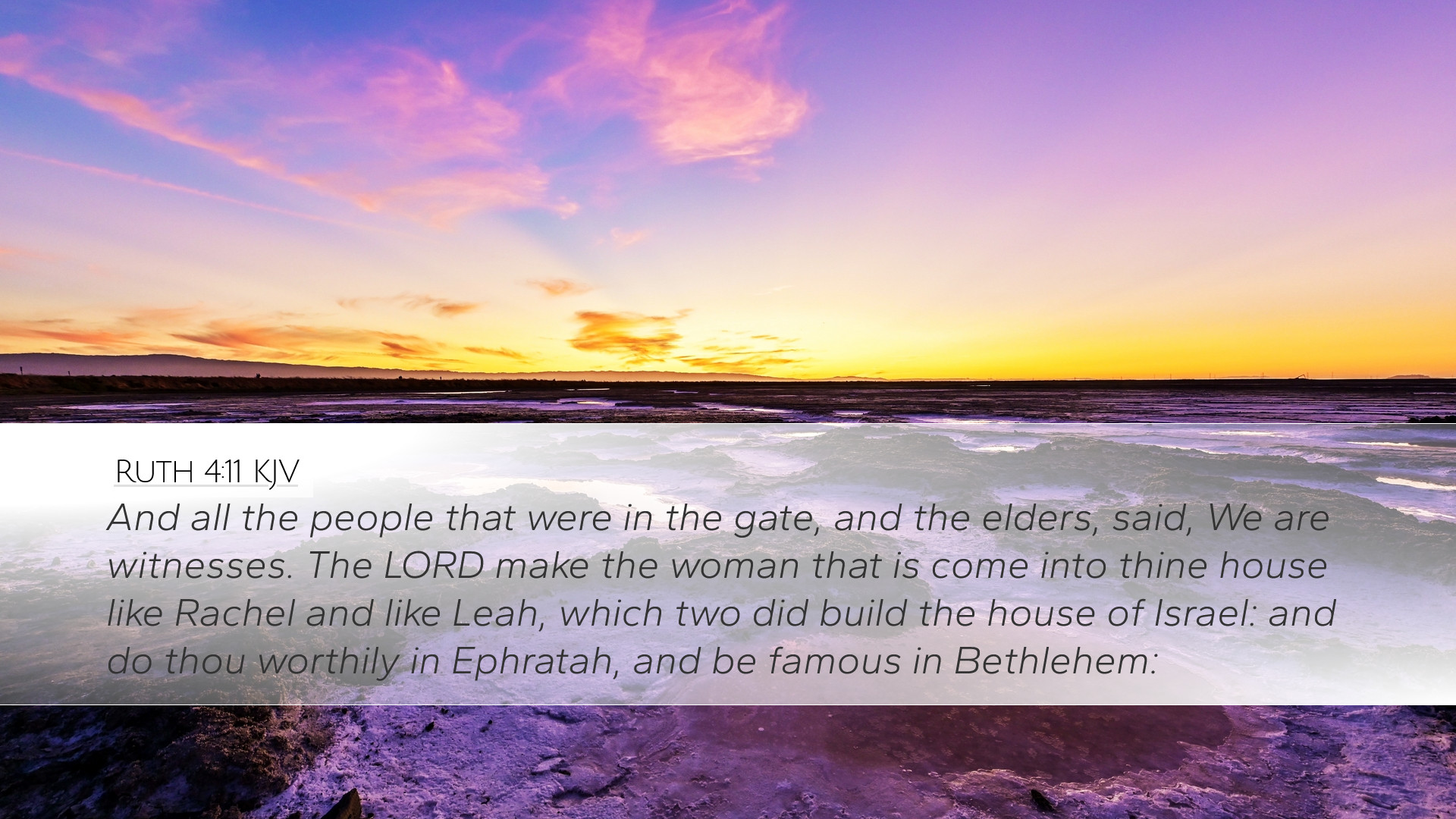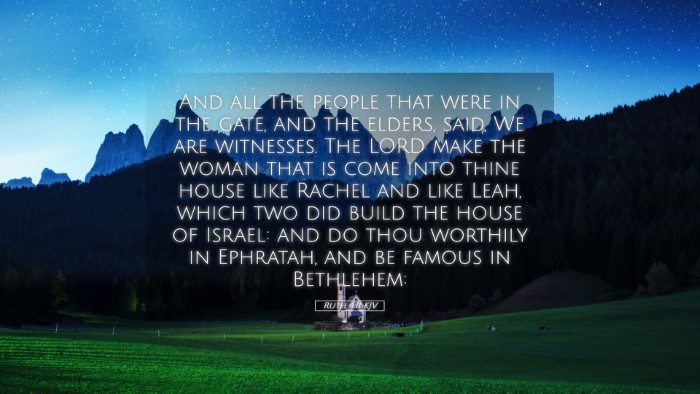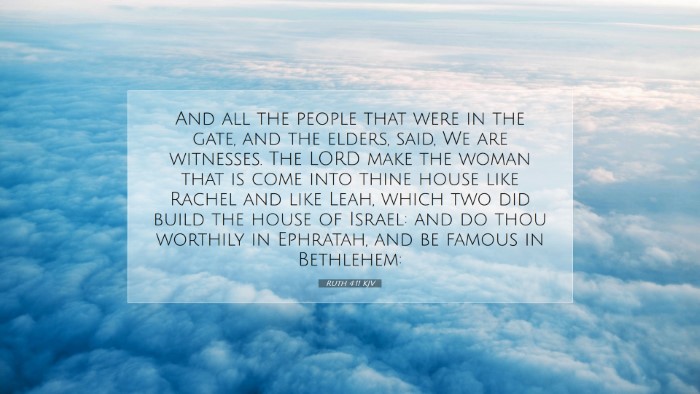Old Testament
Genesis Exodus Leviticus Numbers Deuteronomy Joshua Judges Ruth 1 Samuel 2 Samuel 1 Kings 2 Kings 1 Chronicles 2 Chronicles Ezra Nehemiah Esther Job Psalms Proverbs Ecclesiastes Song of Solomon Isaiah Jeremiah Lamentations Ezekiel Daniel Hosea Joel Amos Obadiah Jonah Micah Nahum Habakkuk Zephaniah Haggai Zechariah MalachiRuth 4:11
Ruth 4:11 KJV
And all the people that were in the gate, and the elders, said, We are witnesses. The LORD make the woman that is come into thine house like Rachel and like Leah, which two did build the house of Israel: and do thou worthily in Ephratah, and be famous in Bethlehem:
Ruth 4:11 Bible Commentary
Commentary on Ruth 4:11
Verse Overview: Ruth 4:11 is a pivotal moment in the narrative of Ruth, encapsulating themes of redemption, community, and divine providence. In this verse, the people of the city, along with the elders, bless Boaz, recognizing his marriage to Ruth as a significant and virtuous act. Their words echo the larger narrative of God's faithfulness and the restoration of Naomi's family lineage.
Insights from Public Domain Commentaries
1. Matthew Henry’s Commentary
Matthew Henry emphasizes the importance of community recognition in Boaz’s marriage to Ruth. He notes that the blessings pronounced by the people reflect a communal acknowledgment of God’s work in their lives. Henry points out that such public declarations signify the reader's (and the community’s) involvement in God’s redemptive plans.
"The people commend Boaz for his choice, as Ruth was not only virtuous but also a woman of noble character. This serves as a reminder that God’s chosen ones often exhibit grace and strength, qualities to be esteemed in any society."
2. Albert Barnes’ Commentary
Albert Barnes provides an in-depth analysis of the cultural implications of this verse. He explains that the blessings invoked by the elders speak to the hope of prosperity and legacy. Boaz is urged to become a father to Ruth, paralleling the lineage of Perez. Barnes highlights that this connection to Perez is critical as it links the story of Ruth to the larger narrative of Israel's history and divine purpose.
"This blessing implies that Boaz would be honored in his lineage, reflecting God's intention to weave Ruth into the fabric of Israel’s redemption story. The inclusion of Ruth, a Moabite, stands as a testament to God's grace extending beyond Israel, emphasizing inclusivity in the kingdom of God."
3. Adam Clarke’s Commentary
Adam Clarke focuses on the theological implications of Ruth 4:11. He argues that the blessings act as prophetic, indicating that Ruth’s union with Boaz would produce significant offspring. Clarke suggests that the blessings signify not only the immediate joy of Ruth and Boaz but also foreshadow the genealogy culminating in King David, and ultimately, in the lineage of Christ.
"The blessings of the elders can be seen as a direct link to God’s redemptive plan, manifesting in the Davidic line. This inclusion is not merely historical; it illustrates the way God honors faithfulness and righteousness, giving rise to a legacy that carries forward His promise of redemption for humanity."
Theological Themes in Ruth 4:11
- Divine Providence: The verse reflects God's orchestrating of events for the fulfillment of His purpose. The choice of Boaz and Ruth is a testimony to God's sovereign plan.
- Redemption and Restoration: The blessings signify not only personal redemption for Ruth and Boaz but also communal restoration for Naomi's family line.
- Community Involvement: The public acknowledgment of the marriage represents the vital role of the community in the plan of God, demonstrating that individual acts of faithfulness can have widespread implications.
- Inclusivity of Grace: This narrative highlights that God’s grace extends beyond ethnic and cultural boundaries, as seen in Ruth’s heritage.
Practical Applications for Pastors and Theologians
This verse serves as an encouragement to those in ministry, reminding them of the importance of community blessings in the lives of individuals. The act of publicly supporting those who are being restored or starting anew reflects the heart of God.
"Just as the community in Bethlehem celebrated the union of Boaz and Ruth, churches today are called to recognize and bless those who step into new lives or ministries, fostering an environment of encouragement and support."
For students and scholars, the narrative encapsulated within Ruth 4:11 emphasizes the significance of genealogical studies in understanding the biblical text. The link between personal decisions and God’s larger plan is a crucial aspect of biblical theology.
Conclusion: Ruth 4:11 transcends a mere historical account; it encapsulates profound spiritual truths about God’s redemptive nature, community dynamics, and the unfolding of His promises. The insights from Matthew Henry, Albert Barnes, and Adam Clarke provide a rich tapestry for interpretation and application, making it a cornerstone for understanding God's work through individuals and communities.


